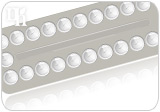Hormones are chemical messengers that are transported round the body and control many bodily functions. The hormones estrogen, progesterone, and testosterone are particularly active during puberty, menstruation, pregnancy, and menopause. During these stages, it is possible that too much or lack of a certain hormone is released. This can have surprising and distressing effects on the body. Symptoms of hormonal imbalance can be psychological or physical, and include hot flashes, fatigue, hair loss, and loss of libido, among others.

There are three principal medicines to treat hormone imbalance, and to relieve these symptoms. These are hormone replacement therapy (HRT), bioidentical hormone replacement therapy (bHRT), and alternative medication. Read on to learn more about treatments for hormone imbalance, how they work, and the risks and benefits associated with each one.
Hormone Replacement Therapy
HRT involves estrogen, progesterone, or testosterone being introduced into the body to boost hormone levels. HRT is a particularly effective treatment for hormone imbalance, as it addresses hormone levels directly and immediately. It is available in many forms, including cream, pills, drops, patches, and gels.
However, there are some undesirable risks and side effects associated with HRT. It is thought to increase the risk of breast cancer, strokes, cardiovascular disease, and blood clotting. It can also produce unpleasant side effects including nausea, vomiting, headaches, acne, and bloating.
Bioidentical Hormone Replacement Therapy
Bioidentical hormones are plant-based hormones produced in a laboratory. They are usually made from soy derivatives, as soy contains estrogen-like substances. Bioidentical hormones have the same molecular structure as the hormones produced in the body, and act in the same way. They are available as pills, patches, creams, lotions, or vaginal rings.
However, they are also associated with severe risks and uncomfortable side effects. Similar to regular HRT, bioidentical hormone replacement therapy might increase the risk of stroke, heart attack, and blood clotting, and that side effects include weight gain, abdominal pain, and nausea.
Alternative Medication

Alternative medicines, such as herbal supplements offer a natural solution to hormone imbalance. Black cohosh, ginseng, dong quai, and soy all contain phytoestrogens, an estrogen-like substance produced in the plant. However, they should not be taken alongside other medication, or in excessive quantities, these herbal remedies can be an effective way to treat hormone imbalance.
Current research indicates that estrogen levels in the body reduce naturally for health reasons, so more natural menopause treatments should always be tried as a first recourse, such as making changes to diet and exercise regime, complemented by herbal supplements.
It is important to be aware of the risks, benefits, and availability of all the treatments for hormone imbalance that you are considering. This will enable you to choose the right treatment for you. Click on the following link to learn more about treatments for hormonal imbalance.


